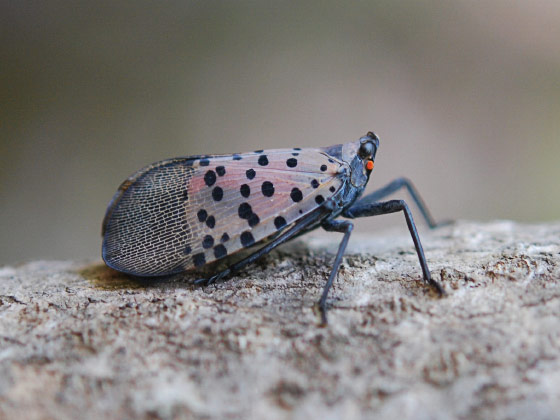Upcoming Spotted Lanternfly Webinars
 |
|
Adult spotted lanternfly. Photo by Lawrence Barringer, Pennsylvania Department of Agriculture, Bugwood.org |
A new IPM working group was formed recently to address the threat posed by the spotted lanternfly (SLF, Latin name Lycorma delicatula), an invasive plant hopper native to China, Vietnam, and India. The first working group meeting was held in July 2018 at Albright College in Reading, PA.
SLF poses a threat to forests as well as to the agriculture and tourism industries. The presence of the pest in the U.S. was confirmed in Pennsylvania in September 2014, and it has since been found in New Jersey, Delaware, Virginia, and New York. It is known to feed on 70 species of plants in both agricultural and urban settings throughout the northeastern United States.
SLF is an excellent hitchhiker and moves primarily through human activities, giving it the potential to show up anywhere in the United States. Quarantine is one tactic used to limit the pest’s spread. Pennsylvania has a 13-county quarantine in place, restricting outgoing shipments, and New York is employing an external quarantine, with the New York State Department of Agriculture and Markets inspecting vehicles entering from Pennsylvania via major highways.
In conjunction with the New York State IPM Program and the Department of Agriculture and Markets, the Northeastern IPM Center will host a collection of SLF webinars, titled “Spotted Lanternfly Basics,” in the coming months. While the content may be relevant to audiences throughout the Northeast, management practices covered will be specific to New York.
Each webinar will focus on, and be tailored to, a specific commodity group: grape and apple industries; nursery, greenhouse, and landscape industries; hops, berry, and vegetable growers; and Christmas tree growers.
All will follow a similar format that covers SLF biology, identification, and hosts, monitoring and management strategies, and a regulatory update. Participants will be encouraged to ask questions.
More information, including dates, times, and registration information, will be posted on our website at http://neipmc.org/go/mYey.
The Northeastern IPM Center promotes integrated pest management for reducing risks to human health and the environment. If republishing our news, please acknowledge the source (“From Northeast IPM Insights”) along with a link to our website.
